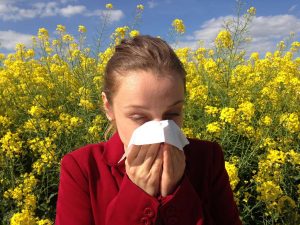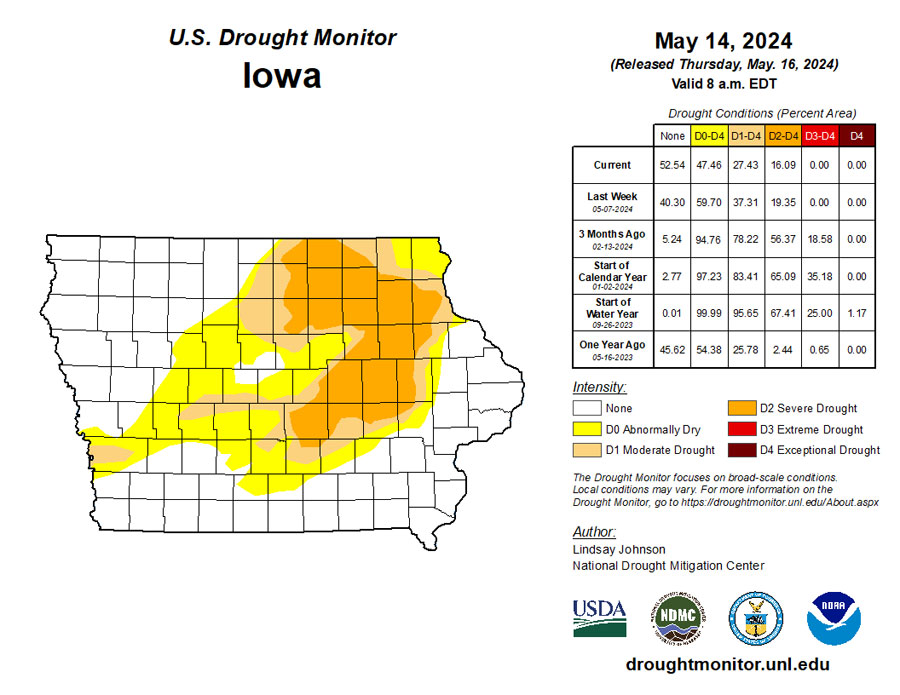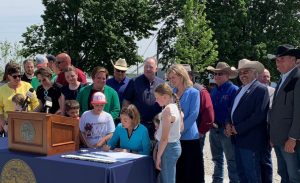CLICK HERE for the latest market quotes from the Iowa Agribusiness Network!
CLICK HERE for the latest market quotes from the Brownfield Ag News Network!
CLICK HERE for the latest market quotes from the Iowa Agribusiness Network!
CLICK HERE for the latest market quotes from the Brownfield Ag News Network!
(Radio Iowa) – Iowa’s spring turkey hunting season wrapped up with a record harvest of just more than 16-thousand birds, topping the record set last season by around 12-hundred. D-N-R Wildlife Research Biologist Jim Coffey says the records are one good thing to come from the dry weather. “We’ve had three good years of back to back hatches, and then just some exceptional weather that just made for good turkey hunting conditions,” he says. The weather allowed more young turkeys to survive after hatching. “Typically cold wet weather is not good for ground nesting birds so drought conditions we tend to see a bump up in production,” Coffey says. “It can be too dry as you get farther west that can have an impact, but we kind of hit the sweet spot the last few years.”
He says more hunters chase the elusive wild turkeys. “So success rate right now will probably be about the same and that 25 percent category, but we did see an increase in license sales as well. And that’s usually an indication of people noticing more birds on the landscape or more game to chase,” he says. “And so we always usually see a little bit of an uptick in hunter numbers when we see an uptick in populations.” Coffey says bagging a wild turkey is one of the tougher challenges. “They can be very difficult, they’re very weary they’ve got great eyesight and great hearing and they don’t give you a lot of room for error if you’re a new inexperienced hunter and even a seasoned hunter that Turkey is a difficult query to get after,” Coffey says.
Coffey says the turkey numbers could be strong again next season. “This year with extreme rain we’re having will probably you know speculating see a downturn in the population. But we have to remember that it’s usually the two year old birds are what carry the numbers,” he says. “And so next year is birds will really be the ones that were hatched last year and 2023. So we should have good turkey numbers for another year or two depending on how the weather lays out the next couple of years.”
Coffey says wild turkeys won’t be the same as the ones you buy at the grocery store. “They’re a little drier because they don’t have the fat that a domestic bird does. And of course domestic birds are bred for that delicious taste and that moist moisture content,” Coffey says. “We have to remember that most domestic birds are less than six months old. And most of the males that we’re harvesting in the field of the wild, they’re probably two years old. So kind of think of a fit athlete. The muscle is a little tighter, a little more structure to it, and not as much fat in it.”
Hunters report taking turkeys in all 99 counties — with a high of 649 birds bagged in Clayton County to a low of three in Osceola County.
(Radio Iowa) – One of the people who oversees the airport in Emmetsburg is raising concerns about a wind farm proposed in Palo Alto County. “I can tell you this — if they put 599 foot wind towers very close to the airport, it is going to affect traffic,” said Gary Koppie, chairman of the Emmetsburg Municipal Airport Commission. “There’s just no question about it.”
According to Koppie, some of the proposed turbine sites are close to the airport and that may impact when helicopter ambulances are able to land and take off at Emmetsburg’s airport if the turbines aren’t visible. “Because of the inclement weather that we have around here at times, you know,” Koppie said. “Now I’m not saying LifeFlight won’t come in because they will, but there will be days that they cannot.”
Koppie attended a Palo Alto County Board of Supervisors hearing about the wind farm’s site plan and permit application this week. Shane Roche, development manager for the Lost Island project, said it will create over 250 short term jobs during construction. “We’re excited to be in the county and ensure that the county becomes prosperous,” he said, “give our over landowners some steady, weather-proof income.”
The county board of supervisors expects to make its decision on the project by the end of this month. The proposed Lost Island wind farm’s name comes from the Lost Island township in Palo Alto County.
(Radio Iowa) – All the recent rain has helped keep pollen counts down in Iowa, but soon enough, the state’s allergy sufferers will be red-eyed, sneezing and sniffling. Dr. Ravi Johar, at UnitedHealthcare, says while the chilly winter weather may be gone, that pesky pollen will force some Iowans to remain indoors. “Unfortunately, when you get outside, it can be a miserable time for a lot of folks. They can get what are called seasonal allergies, allergic rhinitis, things of that sort,” Johar says. “In fact, about 50-million Americans suffer from allergies like that and that costs over $3 billion in medical costs per year.”
Johar says seasonal allergies are typically at their peak during April, May and June. For now, he recommends that people with allergies try using air purifiers indoors, and limit their time outdoors. “We’re really talking about things like all the outdoor triggers, things like tree, grass, and wheat pollen,” he says. “Those would start to increase as all those plants are growing, and when we have dry, windy days, that spreads the pollen everywhere and so you have much, much higher pollen counts.” A wide variety of allergy medications are available without a prescription. Everyone’s a bit different, so if one drug doesn’t work for you, another might. 
“Things like pseudoephedrine, which can help provide temporary relief from nasal stuffiness, those are different nasal sprays also that can help,” Johar says. “There’s combination medications that combine both antihistamines and the decongestants. If those over-the-counter ones don’t work, it’s probably really time to start talking to your doctor to see if there’s any prescription medication that you may take.”
He recommends running your air conditioner in your home and car to keep the pollen out. Johar also says to avoid leaving your clothes out to dry on a clothesline as they can collect pollen.
(Radio Iowa) – Lawmakers have directed the Iowa Natural Resources Commission to review how accessible state parks are to people with disabilities and recommend improvements. Governor Kim Reynolds signed the bill into law at Big Creek State Park. “It’s hard to imagine a better way to experience the natural beauty Iowa has to offer than by making a trip to one of our many outstanding state parks,” Reynolds says. “Every Iowan, regardless of physical ability, should have the opportunity to experience them first hand.”
The bill passed the legislature unanimously. Representative Adam Zabner, a Democrat from Iowa City, made the proposal in January.”It was because I’ve heard from so many Iowans about challenges finding outdoor opportunities that are accessible,” Zabner said.
The new law directs the Iowa Department of Natural Resources to come up with a list of opportunities for persons with disabilities in state parks and public recreation areas and put that list on the department’s website. “Iowa is such a beautiful state and I know that access to the outdoors can be transformative,” Zabner said. “This time of year, all I want to do is get out to Lake Macbride in Johnson County, so very, very excited that we were able to get this done.”
Iowa Department of Natural Resources director Kayla Lyons says new construction projects at the parks over the past dozens years have met Americans with Disabilities Act standards. Over the past five years, engineering interns traveled to all state parks with D-N-R staff to audit accessibility issues. “We want to provide facilities and experiences for everyone,” Lyons says. “…With more accessible facilities, better information on our website about accessible trails, bathrooms, fishing piers and other items.”
The agency has purchased an electronic track chair that will help Big Creek visitors with limited mobility get around the park. “It will be available to anyone now, free of charge to anyone. It’s on a first come, first served basis through our concessionaire here at Big Creek. It’s the only one we have so far, but hopefully we’ll have more in the future,” Lyons says. “We’re excited to have the combination of the track chair and our infrastructure improvements to address accessibility in our state parks.”
A grant from the Ford Motor Company’s Bronco Wild Fund paid for the track chair and a person named Jack used it to move from sidewalks to grassy areas and the beach after the bill signing ceremony. Senator Annette Sweeney, a Republican from Iowa Falls who led senate debate of the bill, says it shows how making state parks accessible will open up new adventures for some Iowans. “With this bill being definitely a bipartisan bill, we got to work together because we believe all Iowans should be able to enjoy our great outdoors,” Sweeney said.
The legislature appropriated 250-thousand dollars to finance some of the fixes, including sidewalk and curb repairs, needed to make state park facilities more accessible to people with disabilities.
(Radio Iowa) – The latest report out today shows the amount of drought in Iowa continues to shrink.
The U.S. Drought Monitor shows nearly 53% of the state is now drought free. That compares to September when the entire state was in some sort of drought, and the start of this year when only about three percent of the state had no drought conditions. 
The driest conditions remain in a line from Mitchell County at the northern border down through 23 other counties in northeast and central Iowa. Those counties all have some level of severe drought.
(Radio Iowa) – The recent crossover outbreaks of avian influenza in cattle in several states have Iowa beef and dairy producers on alert and U.S. Senator Chuck Grassley is calling for better communication from multiple federal agencies on the topic.
Grassley says with bird flu outbreaks in cattle in Kansas, New Mexico and Texas, he wants to ensure the U.S. Department of Agriculture. is working hand-in-hand with the Food and Drug Administration and the Centers for Disease Control and Prevention in sharing information with each other and with the public.
“It’s fair to assume we could have the same bureaucratic problems that we have throughout government on any issue, not just avian flu,” Grassley says, “and that is, each department operates like a silo. There’s not the proper cooperation on any issue.”
Back in 2015, a widespread outbreak of avian flu forced the slaughter of more that 43-million birds in 15 states, including nearly 30-million just in Iowa, the nation’s top egg producer. Egg prices bounded some 120-percent over the course of just a few weeks.
“In 2015, when the avian flu first hit birds in Iowa, there weren’t any protocols in place,” Grassley says. “And now when we have break out in poultry, we don’t worry too much about it. We know that the Iowa Department of Agriculture knows what steps to date.”
Grassley and several colleagues from both parties have sent a letter to the three agencies, urging them “to strengthen and coordinate public information-sharing” to ensure producers — and the public — are being fully informed about outbreaks.
“Now, I’m not saying that that isn’t happening in the case of avian flu and the three agencies that we wrote to,” Grassley says, “but we want to make sure that we’re on top of it, so we don’t be in the same place with dairy cattle that we were with poultry in 2015.”
In their letter, lawmakers said previous outbreaks have benefited from a “consortium strategy” where the USDA brought together experts in epidemiology and animal health research to lessen the potential economic and societal cost of the spread.
(Radio Iowa) – Due to challenging market conditions, Deere and Company is reducing is prediction of profits for its current operating year. Over the past three months, net sales and revenue for Deere products worldwide were down 12 percent. Deere’s chairman and C-E-O points to a decline across the global agricultural sector. Corn and soybean prices are falling, production costs are increasing, and the U-S-D-A predicts farm income in the United States will be down over 25 percent this year.
Deere predicts sales of large farm equipment, like tractors and combines, will be down between 20 and 25 percent for the year. Still, the world’s largest farm equipment maker projects net income for its current fiscal year will be seven BILLION dollars. That’s about half a BILLION below its previous estimate.
Deere’s C-E-O says the company is managing production and inventory levels to adapt to demand. Over three-hundred workers at John Deere’s Waterloo Works were laid off indefinitely at the end of April. Last week, Deere announced 34 workers at one of its plants in Moline, Illinois would be laid off at the end of May.
(Radio Iowa) – Governor Kim Reynolds has signed legislation that creates new labeling requirements for meat and egg alternatives. “If it comes from a plant, an insect or a petri dish, consumers deserve to know,” Reynolds said. Starting July 1st, any plant-based, lab grown or insect-based protein product sold in Iowa stores will have to be clearly labeled as something other than meat or eggs.
“It’s about the common sense idea that a product that’s labeled chicken, beef, pork and so on should maybe actually come from — get this — an animal,” Reynolds said. “That’s kind of what we’re up against sometimes, right?” Reynolds signed the bill before a large crowd gathered on a farm near Ladora where hogs and cattle are raised.
Senator Dawn Driscoll, a Republican from Williamsburg who raises cattle, calls it a “meat integrity” law. “Consumers deserve the truthful labelling on products,” Driscoll said, “and our children deserve better than lab-grown protein.” The law directs state officials to seek a waiver to prevent Iowans from using federal food assistance to buy imitation egg products. It also prohibits school districts, community colleges and the three state universities from buying lab-grown meat and any misbranded protein.

Governor Kim Reynolds signed two bills into law before a crowd on the Pat and Laura Bloome farm in Iowa County, near Ladora. (RI photo)
Representative Heather Hora, a Republican from Washington, is a pork producer. “This bill protects the millions of farmers’ check off dollars invested in marketing meat and eggs throughout the world,” Hora says. “Iowa’s farm families work hard every day to bring nutritious red meat to the market. Lab-grown products are not the same as high quality pork or beef or other meats raised by Iowa farm families and consumers deserve truthful, transparent labeling on products.”
Reynolds signed a second bill into law during her farm stop. It extends a capital gains tax break on state income taxes for the sale of livestock used for breeding, like bulls, boars and rams. “Farm families will save nearly $18 million by 2030,” Reynolds says.
Only Iowans who own livestock and get at least half of their annual income from farming will be able to claim the tax break.